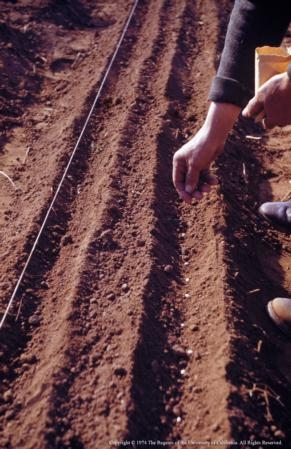Feb 16, 2012
The 2011 UC Master Gardener Vegetable Demonstration Garden Project has recently finished. A group of certified Master Gardeners and trainees spent time each week from January 27 through December 15 learning vegetable gardening techniques through hands-on experience.
They documented their project so that they could impart lessons learned throughout the2011 project. This article is the eighth, and final, in a series to share this knowledge.
Seed storage:
Saving and storing seeds can provide additional fun and learning opportunities to vegetable gardening.
- Be sure that seeds being used are not beyond their expiration date.
- Consider saving seeds from plants with superior characteristics (e.g., hardy during cool temperatures).
- If you plan to save the seeds from your corn plants, you need to take steps to avoid cross-pollination from other corn plants. To keep heirloom corn pure, you have two options: 1) bag the ears and tassels, and hand pollinate, or 2) arrange it so your corn blooms earlier than any other corn around you.
- The female flowers of each crop can be fertilized only by pollen from male flowers of the same species. Cross pollination, however, can occur between varieties within a species. When crosses occur between members of the same species, we do not see the effect of the cross the first year. However, if the seeds are saved and planted, the plants will produce fruit that will be different from either of the parents.
- There is no reason to soak zucchini seeds in water prior to storage since the pulp can readily be separated from the seed. The pulp on tomato seeds, however, is tightly attached to the seeds making it necessary to soak the seeds for a few days. Once the pulp begins to ferment, it is easily separated from the tomato seeds.
- After soaking tomato seeds in water for two or three days, the viable seeds will sink to the bottom of the container. Dispose of the tomato seeds that float to the surface.
- The way to tell if zucchini seeds are viable is to look for plump seeds. Small flat zucchini seeds will most likely not germinate or will be of poor quality. Since viable zucchini seeds will float in water, the float test used to differentiate poor quality tomato seeds from viable seeds should not be used.
Questions on gardening? Please contact our Master Gardener helpline at 645-1455 or contact them by email at mgventura@ucdavis.edu.

Saving and storing seeds can provide additional fun and learning opportunities to vegetable gardening.
Topics: